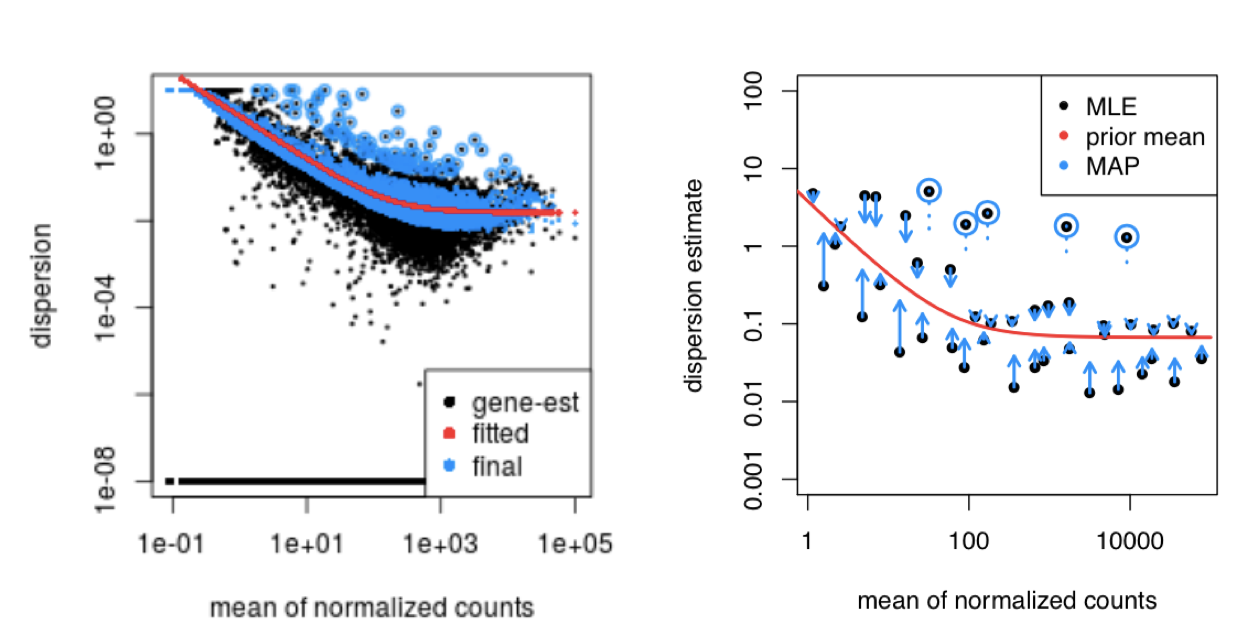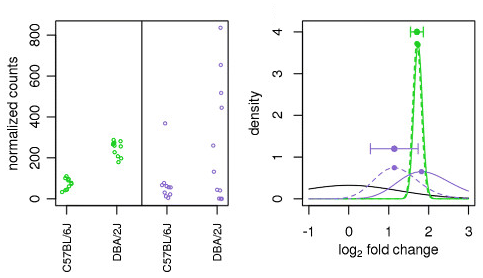class: center, middle, inverse, title-slide .title[ # Differential Gene Expression ] .subtitle[ ## Workshop on RNA-Seq ] .author[ ### <b>Roy Francis, Julie Lorent</b> | 15-Mar-2023 ] .institute[ ### NBIS, SciLifeLab ] --- exclude: true count: false <link href="https://fonts.googleapis.com/css?family=Roboto|Source+Sans+Pro:300,400,600|Ubuntu+Mono&subset=latin-ext" rel="stylesheet"> <link rel="stylesheet" href="https://use.fontawesome.com/releases/v5.3.1/css/all.css" integrity="sha384-mzrmE5qonljUremFsqc01SB46JvROS7bZs3IO2EmfFsd15uHvIt+Y8vEf7N7fWAU" crossorigin="anonymous"> <!-- ------------ Only edit title, subtitle & author above this ------------ --> --- name: intro ## What I'll talk about in this lecture - Compare gene expression between 2 groups of samples - while accounting for differences in sequencing depth - by testing for differences in means with appropriate estimation of count data variability - Calculate log fold changes - Step by step description of DESeq2 analysis ## What Paulo will discuss tomorrow - More information on count data distributions - Batch effects - Advanced designs - Reminder about p-values and multiple testing --- name: prep ## Preparation - DEseq2 (and edgeR) take as input raw counts and metadata. - Create the DESeq2 object ```r library(DESeq2) mr$Group <- factor(mr$Group) d <- DESeqDataSetFromMatrix(countData=cf,colData=mr,design=~Group) d ``` ``` ## class: DESeqDataSet ## dim: 10573 6 ## metadata(1): version ## assays(1): counts ## rownames(10573): ENSMUSG00000098104 ENSMUSG00000033845 ... ## ENSMUSG00000063897 ENSMUSG00000095742 ## rowData names(0): ## colnames(6): DSSd00_1 DSSd00_2 ... DSSd07_2 DSSd07_3 ## colData names(7): SampleName SampleID ... Group Replicate ``` - Categorical variables must be factors - Building GLM models: `~var`, `~covar+var` ??? - The model `~var` asks DESeq2 to find DEGs between the levels under the variable *var*. - The model `~covar+var` asks DESeq2 to find DEGs between the levels under the variable *var* while controlling for the covariate *covar*. --- name: dge-sf ## Size factors - Objective of the differential gene expression: compare concentration of cDNA fragments from each gene between conditions/samples. - Data we have: read counts which depend on these concentration, but also on sequencing depth - Total count can be influenced by a few highly variable genes - For this reason, DESeq2 uses size factors (median-of-ratios) instead of total count as normalization factors to account for differences in sequencing depth - Normalisation factors are computed as follows: ```r d <- DESeq2::estimateSizeFactors(d,type="ratio") sizeFactors(d) ``` ``` ## DSSd00_1 DSSd00_2 DSSd00_3 DSSd07_1 DSSd07_2 DSSd07_3 ## 1.0136617 0.9570561 0.9965245 1.0354178 1.0780855 1.0017753 ``` --- name: neg-binom ## Negative binomial distribution - RNAseq data is not normally distributed neither as raw counts nor using simple transformations - DESeq2 and edgeR instead assume negative binomial distributions. - Given this assumption, to test for differential expression, one need to get a good estimate of the dispersion (variability given the mean). --- name: dge-dispersion-1 ## Dispersion - Dispersion is a measure of spread or variability in the data. - Variance is a classical measure of dispersion which is usually not used for negative binomial distributions because of its relationship to the mean - The DESeq2 dispersion approximates the coefficient of variation for genes with moderate to high count values and is corrected for genes with low count values <img src="slide_dge_files/figure-html/unnamed-chunk-6-1.svg" style="display: block; margin: auto auto auto 0;" /> --- name: dge-dispersion-2 ## Dispersion - RNAseq experiments typically have few replicates - To improve the dispersion estimation in this case, we "borrow" information from other genes with similar mean values ```r d <- DESeq2::estimateDispersions(d) ```  --- name: dge-test ## Testing - Log2 fold changes changes are computed after GLM fitting `FC = counts group B / counts group A` ```r dg <- nbinomWaldTest(d) resultsNames(dg) ``` ``` ## [1] "Intercept" "Group_day07_vs_day00" ``` -- - Use `results()` to customise/return results - Set coefficients using `contrast` or `name` - Filtering results by fold change using `lfcThreshold` - `cooksCutoff` removes outliers - `independentFiltering` removes low count genes - `pAdjustMethod` sets method for multiple testing correction - `alpha` set the significance threshold --- name: dge-test-2 ## Testing ```r res <- results(dg,name="Group_day07_vs_day00",alpha=0.05) summary(res) ``` ``` ## ## out of 10573 with nonzero total read count ## adjusted p-value < 0.05 ## LFC > 0 (up) : 193, 1.8% ## LFC < 0 (down) : 238, 2.3% ## outliers [1] : 1, 0.0095% ## low counts [2] : 4920, 47% ## (mean count < 21) ## [1] see 'cooksCutoff' argument of ?results ## [2] see 'independentFiltering' argument of ?results ``` - Alternative way to specify contrast ```r results(dg,contrast=c("Group","day07","day00"),alpha=0.05) ``` --- name: dge-test-3 ## Testing ```r head(res) ``` ``` ## log2 fold change (MLE): Group day07 vs day00 ## Wald test p-value: Group day07 vs day00 ## DataFrame with 6 rows and 6 columns ## baseMean log2FoldChange lfcSE stat pvalue ## <numeric> <numeric> <numeric> <numeric> <numeric> ## ENSMUSG00000098104 18.8505 0.205656 0.401543 0.512164 0.6085362 ## ENSMUSG00000033845 23.3333 0.653565 0.379627 1.721596 0.0851426 ## ENSMUSG00000025903 37.1016 0.672348 0.298923 2.249232 0.0244977 ## ENSMUSG00000033793 33.3673 0.144833 0.305139 0.474646 0.6350394 ## ENSMUSG00000025907 22.3875 0.821006 0.376414 2.181125 0.0291742 ## ENSMUSG00000051285 21.1485 0.452451 0.378725 1.194669 0.2322163 ## padj ## <numeric> ## ENSMUSG00000098104 NA ## ENSMUSG00000033845 0.377432 ## ENSMUSG00000025903 0.177491 ## ENSMUSG00000033793 0.886264 ## ENSMUSG00000025907 0.201741 ## ENSMUSG00000051285 NA ``` --- name: dge-test-4 ## Testing - Use `lfcShrink()` to correct fold changes for genes with high dispersion or low counts - Does not change number of DE genes  --- name: acknowl ## Acknowledgements - RNA-seq analysis [Bioconductor vignette](http://master.bioconductor.org/packages/release/workflows/vignettes/rnaseqGene/inst/doc/rnaseqGene.html) - [DGE Workshop](https://github.com/hbctraining/DGE_workshop/tree/master/lessons) by HBC training <!-- --------------------- Do not edit this and below --------------------- --> --- name: acknowl ## Acknowledgements - RNA-seq analysis [Bioconductor vignette](http://master.bioconductor.org/packages/release/workflows/vignettes/rnaseqGene/inst/doc/rnaseqGene.html) - [DGE Workshop](https://github.com/hbctraining/DGE_workshop/tree/master/lessons) by HBC training --- name: end_slide class: end-slide, middle count: false # Thank you. Questions? .end-text[ <p>R version 4.1.3 (2022-03-10)<br><p>Platform: x86_64-pc-linux-gnu (64-bit)</p><p>OS: Ubuntu 18.04.6 LTS</p><br> <span class="small">Built on : <i class='fa fa-calendar' aria-hidden='true'></i> 15-Mar-2023 at <i class='fa fa-clock-o' aria-hidden='true'></i> 14:48:54</span> <b>2023</b> • [SciLifeLab](https://www.scilifelab.se/) • [NBIS](https://nbis.se/) ]